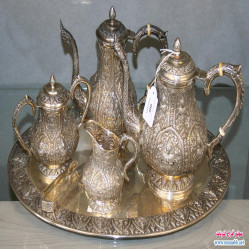Containers, plates and utensils
It is permissible to all Muslims to use all types of utensils, containers and plate including those made from metal.

It is permissible to all Muslims to use all types of utensils, containers and plate including those made from metal.

Any water could be used for purification if it retains its original state as it is created. This water is called “Tahur” and it could be taken from any source; whether it is rain, rivers or coming up from the earth.

Muslims must be pure before praying or any other act of worship requiring purity. Purification means the removal of any physical discharge from private parts which require washing, water sprinkling or wiping.

Simplified explanation of the Five pillars of Islam: declaration of faith, prayer, zakat, fasting and pilgrimage, which represent a framework of the Muslim life and the core of Islam religion. Moreover it talks about the The main message of Islam.

Simplified explanation of the Five pillars of Islam: declaration of faith, prayer, zakat, fasting and pilgrimage, which represent a framework of the Muslim life and the core of Islam religion. Moreover it talks about the The main message of Islam.

Simplified explanation of the Five pillars of Islam: declaration of faith, prayer, zakat, fasting and pilgrimage, which represent a framework of the Muslim life and the core of islam religion. Moreover it talks about the The main message of Islam.

Simplified explanation of the Five pillars of Islam: declaration of faith, prayer, zakat, fasting and pilgrimage, which represent a framework of the Muslim life and the core of islam religion. Moreover it talks about the The main message of Islam.

Simplified explanation of the Five pillars of Islam: declaration of faith, prayer, zakat, fasting and pilgrimage, which represent a framework of the Muslim life and the core of Islam religion. Moreover it talks about the The main message of Islam.

Simplified explanation of the Five pillars of Islam: declaration of faith, prayer, zakat, fasting and pilgrimage, which represent a framework of the Muslim life and the core of Islam religion. Moreover it talks about the The main message of Islam.

A brief introduction to the meaning of Islamic jurisprudence (fiqh), its principles, and The Leading Fiqh Scholars such as Abu Hanifah, Malik, Al-Shafi'i and Ahmad ibn Hanbal. It includes all the practical rules that every Muslim, man or woman, should know, citing their bases in the Qur’an and the Sunnah in an easy and simple way.

A brief introduction to the meaning of Islamic jurisprudence (fiqh), its principles, and The Leading Fiqh Scholars such as Abu Hanifah, Malik, Al-Shafi'i and Ahmad ibn Hanbal. It includes all the practical rules that every Muslim, man or woman, should know, citing their bases in the Qur’an and the Sunnah in an easy and simple way.

A brief introduction to the meaning of Islamic jurisprudence (fiqh), its principles, and The Leading Fiqh Scholars such as Abu Hanifah, Malik, Al-Shafi'i and Ahmad ibn Hanbal. It includes all the practical rules that every Muslim, man or woman, should know, citing their bases in the Qur’an and the Sunnah in an easy and simple way.

A brief introduction to the meaning of Islamic jurisprudence (fiqh), its principles, and The Leading Fiqh Scholars such as Abu Hanifah, Malik, Al-Shafi'i and Ahmad ibn Hanbal. It includes all the practical rules that every Muslim, man or woman, should know, citing their bases in the Qur’an and the Sunnah in an easy and simple way.

A brief introduction to the meaning of Islamic jurisprudence (fiqh), its principles, and The Leading Fiqh Scholars such as Abu Hanifah, Malik, Al-Shafi'i and Ahmad ibn Hanbal. It includes all the practical rules that every Muslim, man or woman, should know, citing their bases in the Qur’an and the Sunnah in an easy and simple way.

A brief introduction to the meaning of Islamic jurisprudence (fiqh), its principles, and The Leading Fiqh Scholars such as Abu Hanifah, Malik, Al-Shafi'i and Ahmad ibn Hanbal. It includes all the practical rules that every Muslim, man or woman, should know, citing their bases in the Qur’an and the Sunnah in an easy and simple way.

A brief introduction to the meaning of Islamic jurisprudence (fiqh), its principles, and The Leading Fiqh Scholars such as Abu Hanifah, Malik, Al-Shafi'i and Ahmad ibn Hanbal. It includes all the practical rules that every Muslim, man or woman, should know, citing their bases in the Qur’an and the Sunnah in an easy and simple way.